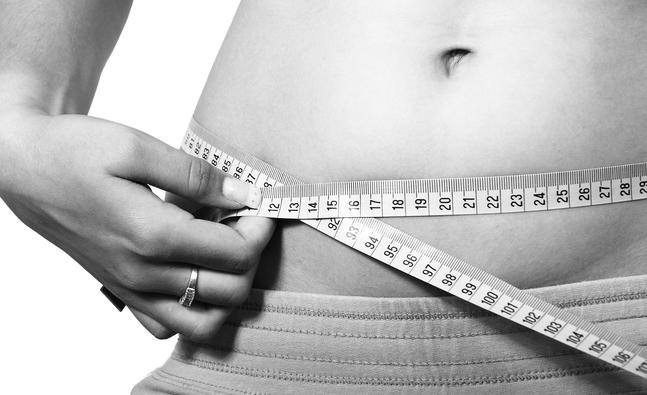These 6 Common Thoughts Are Making You Gain Weight
Several years ago, I came home from a first date, walked into my apartment, headed straight to the fridge, and dove into my pasta leftovers. I washed it all down with a pint of ice cream.
So what happened there? When I'd left my date, I felt insecure about whether or not he liked me. That made me feel unworthy, unlovable, and undesirable. My thoughts jumped to, “Well, if I were thinner, he would have been into me. I need to change. I’ll start dieting tomorrow, so for now, I’m going to eat all the pasta and ice cream I can get my hands on.” I ate as a distraction from those painful thoughts and because it was "the last time" I could eat those foods before I started another diet.
This was a pattern I continued for years. I thought that if I were thin, I would be so confident, loved, and adored, that those negative voices in my head would disappear. But the thing I got totally wrong is that losing weight doesn’t make the negative chatter stop. It's the opposite: Silencing the negative chatter—or at least managing it—helps us lose weight.
Here’s how to handle those pessimistic thoughts like a boss and probably also shed some pounds in the process.
The Thoughts That Make Us Lose Control
In my practice as a health and wellness coach, I’ve found that my clients, like me, tend to turn to food when they have these thoughts:
"I’m not good enough."
"I’m doing it wrong. I am wrong. Something about my life is wrong."
"I’ll never be as ___ as her. I’m unlovable."
"I’m undesirable."
"I need to change."
These criticisms hit us hard because they make us feel unsafe and unloved. And if we don’t know how to handle them, they can make us feel so low that we turn to food to distract or numb ourselves, which leads to weight gain. Then we feel bad about eating all the stuff we did; it’s a vicious circle.
Separate the Real You and Your Inner Critic
Though you can never completely get rid of these thoughts, by figuring out how to deal with them, you can stop turning to food to quiet your inner critic.
Most people don’t realize that you are not your thoughts. Your thoughts are rooted in your past experiences and your perceptions, but that doesn’t mean those ideas are true.
I tell my clients to categorize their thoughts as either your true self or your inner critic (a.k.a. your ego). Your true self sounds loving, happy, and knows that you have everything you need already. Your inner critic, on the other hand, is judge-y, attacking, and always on the hunt from something that will make it happier.
When we buy into the crazy things our ego tries to tell us, we live a life entrenched in fear, but when we listen to our true self, we feel worthy and confident in who we are right now. When your inner critic starts to flare up, recognize that those thoughts are not true, and separate yourself from them.
Concentrate On Your Real Self
Once you realize how your inner critic works, you can do several things to focus on your true self. Start by choosing to see whatever you’re stressing about with a loving perspective instead. For example, you might have a thought that in order to be desirable, you need to lose weight, or that you are not desirable as you are. But you should remind your inner critic that you are inherently lovable and deserve love just by being human.
If you notice that this negative thought keeps coming up, try to meditate or think about why this keeps occurring. For instance, is it because of something that happened in your past that you're still trying to get over or something you’ve seen someone else go through? This helps you connect to your true self or your intuition and start to reorganize your thoughts. You can also try journaling about what your inner critic says and write a letter from the perspective of your “true self.”
By recognizing that these negative thoughts aren’t real, you can manage your inner critic instead of silencing it with food. Try to make a habit of analyzing your negative thoughts by thinking through them as they come up or taking a few minutes at the end of the day process anything that came up. These exercises help you manage those harsh thoughts and enable you to feel better about yourself. And when you feel more confident in yourself, you’ll find that you’re less inclined to turn to food to make you feel good. Oh, and good news: Weight loss just happens to be a side effect of loving yourself.
Jamie Mendell is a holistic health coach who specializes in helping women lose weight without dieting. To find out more about her philosophy, check out her website. And if you’re looking for deeper ways to take care of yourself so food isn’t your go-to, check out her new Supreme Self-Care program.
-
Casual days help weight loss
-
Why is it so hard to keep the weight off?
-
6 Super snacks of 100 calories or fewer
-
Mind games can help you lose weight
-
Why Jennifer Hudson Will No Longer be a Weight Watchers Ambassador
Since 2010, Jennifer Hudson has given major props to Weight Watchers f
-
5 Proteins you should be eating (but probably arent) PLUS recipes
- DON'T MISS
- Downsize your food choices and your weight
- Clean out your fridge
- A healthy way to spike your metabolism
- Nutritionists Share the 9 Most Common Weight-Loss Mistakes Their Clients Make
- Which chocolate may help prevent weight gain?
- Use smaller cutlery for a smaller waist
- Quick tips for WEIGHT LOSS: Pill popping could make you fatter
- Are grapes good for weight loss?
- How Debra Messing Accidentally Lost 20 Pounds
- Can Acupuncture Help You Lose Weight?




